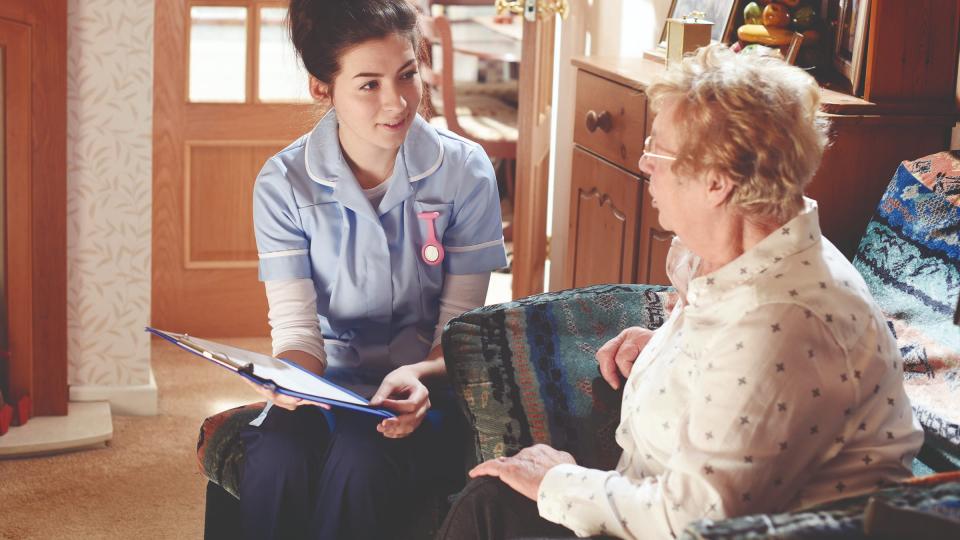- Undergraduate
Mental Health Nursing BNursing (Hons)
Overview
Why study at the University of West London?
- Ranked 30th university in the UK - The Guardian University Guide 2025
- Our Mental Health Nursing courses are ranked #4 in the UK and #1 in London - Guardian University Guide 2025
- Number 1 London university for overall student satisfaction - National Student Survey 2024**
- Best university for Student Experience and Teaching Quality in the UK - The Times and Sunday Times Good University Guide 2024
As a Mental Health Nursing student, you will receive a specialist subject grant of £1,000 per year. This is in addition to the Government grant of at least £5,000 a year - see our Fees and Funding section for more details.
Would you like to specialise in nursing for people with mental health needs? This BNursing degree (equivalent to a BSc Honours in Nursing) will give you the skills and experience you need to provide expert care in a range of healthcare settings.
This course has been approved against the Nursing and Midwifery Council Future Nurse: Standards of Proficiency for Registered Nurses. These standards set out the knowledge and skills you will learn as the next generation of mental health nurses, to enable you to deliver world-class person-centred, evidence-based care.
With equal time spent on practice placement and in the classroom, you will graduate ready to find rewarding work as a specialist in mental health nursing. See what it's like to work as a nurse in London in this video by Health Education England.
Location
This course offered at our West London campus is also offered at our Berkshire Institute for Health in Reading. As you will spend half your course gaining experience on placement, you should choose a course location that you can travel to easily. Please select your preferred location below when applying.

Select your desired study option, then pick a start date to see relevant course information:
Start date:
If your desired start date is not available, try selecting a different study option.
Why study Mental Health Nursing with us?


What our students say…
I came to UWL because I work alongside my studies and the University offers great flexibility. It's really well-equipped and the staff are supportive and friendly.




Course detail & modules
Designed with input from students, service users and our partners in the NHS and voluntary and independent sectors, the course will help you gain the knowledge and skills a twenty-first-century nurse requires.
In accordance with the high standards set by the Nursing and Midwifery Council, you will learn how to:
- provide, lead and coordinate care that is compassionate and evidence-based
- care for people in healthcare settings including their own home, in the community and in hospital
- help to promote health, protect health and prevent ill health
- empower people, communities and populations to take control of their own health decisions and behaviours
- care for people of different ages, backgrounds, cultures and beliefs
- provide nursing care for people with complex mental, physical, cognitive and behavioural care needs
- care for people at the end of their lives
- work proactively across health- and social care services
- think critically and apply your knowledge and skills
- be emotionally intelligent and resilient, while managing your personal health and wellbeing.
Facilities and support
We will provide a supportive learning environment to help you gain confidence as you develop your skills. You will benefit from:
- teaching staff who are highly committed, passionate subject specialists
- a personal tutor to guide you through your course
- regular personalised feedback on your progress in theory and practice components
- access to a variety of practice placements, thanks to our many partners
- high-tech, innovative resources that make your classes fun and engaging.
Our state-of-the-art facilities include a simulation centre, virtual reality facilities and immersive rooms. These all play a major role in our approach to teaching and learning and are located at both our West London and Reading campuses.
Mental Health Nursing placement partners
Your placement is an essential part of your course, giving you practical experience. We currently partner with the following healthcare organisations in North West London:
- Central and North West London NHS Foundation Trust (Brent only)
- West London NHS Trust, encompassing Broadmoor Hospital, one of only three high-secure hospitals in the country
- Private, voluntary and independent organisations.
Compulsory modules
-
Personal Health and Wellbeing
The aim of this module is to explore personal health and wellbeing and how this might impact on your ability to meet physical and mental health care needs.
-
Sciences Underpinning Safe and Effective Nursing Practice
The aim of this module is to introduce the biological and behavioural sciences. This is related to health and wellbeing across the lifespan and knowledge and understanding in these areas applied to nursing care.
-
Understanding Health and Illness
The aim of this module is to introduce key concepts of health and illness and the influences that impact on individual, family and population health and wellbeing.
-
Accountability and Professional Leadership in Nursing Practice
The aim of this module is to develop the self-awareness essential for practising with integrity and the ability to self-manage and develop practice.
-
Foundations of Evidence for Nursing Practice
The aim of this module is to introduce key knowledge and skills to support the identification, use and implementation of evidence to underpin nursing and healthcare interventions and professional practice.
-
Part 1 Nursing Practice
The aim of this module is to ensure you are able and ready to progress into the second year of the course. This will be achieved by field-specific experience in practice placements that include acute and/or community settings and which will be supervised and assessed by appropriately qualified and prepared clinical staff.
Compulsory modules
-
Personal Effectiveness for Professional Practice
The aim of this module is to further develop personal effectiveness and apply critical reflexive skills to develop resilience in the context of current healthcare practice.
-
The Science of Nursing Decision-Making
The aim of this module is to develop the knowledge and skills gained in Year 1 underpinning patient assessment, which informs clinical decision making.
-
The Health Promoting Nurse
The aim of this module is to develop knowledge and skills to effectively promote health, emphasising the key role of the nurse as a health promoter.
-
Leading and Managing Nursing Care
On this module you will explore leadership theory. You will identify your own abilities and areas for development so that you will be able to lead in practice.
-
Evaluating Evidence for Translation into Nursing Practice
The aim of this module is to develop the knowledge and skills required to locate and evaluate a body of research that explores clinical outcomes and/or patient experience. You will also assess the system and contextual issues that facilitate or hinder knowledge translation.
-
Part 2 Nursing Practice
The aim is to ensure you are ready and able to progress into the third year of the course. This will be achieved by field-specific experience in practice placements that include acute and/or community settings and which will be supervised and assessed by appropriately qualified and prepared clinical staff.
Compulsory modules
-
Enhancing Professional Practice
The aim of this module is to prepare you for your role as a registered nurse. You will develop and enhance the communication and procedural skills gained in years 1 and 2. The module links to the Semester 2 module Transitioning to Being a Registrant.
-
Transitioning to Being a Registrant
You will be able to transition from student to registered nurse in your final year and to practice as professionals within the NMC Code in a variety of health and social care environments.
-
Art and Science of Person-Centred Care
The aim of this module is to embed knowledge and skills and focus on increasing complexity in decision making. This to enable you to develop the confidence to involve and empower patients in shared decision making and the co-production of person-centred care.
-
Leading Innovation and Improvement in Nursing Practice
You will develop your skills, knowledge and behaviour for management, leadership and innovation. This is the ‘dissertation’ module.
-
Part 3 Nursing Practice
This module ensures you meet the requirements for completion of the course and can register with the NMC as a nurse in your chosen field. This will be achieved by field-specific experience in practice placements that include acute and/or community settings and which will be supervised and assessed by appropriately qualified and prepared clinical staff.
Entry requirements
These can include:
- A Levels at grade B, B and C, or above
- BTEC Extended Diploma with Distinction, Merit, Merit
- Access to HE Diploma in Nursing/Health or Social Care/Science with a Merit/Distinction profile
- T Levels
Your UCAS points would normally include at least 2 subject areas.
You also need GCSE English and Maths (grade 9 – 4 / A* - C) or Level 2 equivalents.
Experience and recent study
We recommend you should have some experience of:
- studying in the past five years
- working in a health/social care setting (paid/voluntary)
You will be asked to provide a satisfactory reference along with your application form.
All offers are subject to satisfactory enhanced Disclosure and Barring Service (DBS) and occupational health checks.
Find out more about the occupational health clearance requirements, tests and immunisations (pdf, 723kb)
You must be 18 years of age at the start of the course.
Selection Process
If you have the qualifications for this course, you will be asked to attend an individual values-based interview with an academic, clinician and service user/carer.
Fees & funding
Please note:
- Fees for the 2026/27 academic year and onwards may be subject to Government regulation and change.
- Tuition fees are charged for each year of your course. If your course runs for two years or more, you will need to pay the fee for each academic year at the start of that year.
- If your course runs for less than two years, the cost above is for your full course and you will need to pay the full fee upfront.
- If no fee is shown above then the fees for this course are not available yet. Please check again later for updates.
Funding your studies
As a Mental Health Nursing student, you will receive a non-repayable Government grant of at least £5,000 a year, plus a specialist grant of £1,000 per year. Check the NHS financial support information for further details and eligibility for these grants.
UWL also offers a range of scholarships and bursaries, including awards for nursing, midwifery and healthcare. which you may be eligible for.
Please visit our Help with Funding page for more general information and advice:
Teaching staff

Sarah Ransom
I am currently a senior lecturer and a course leader for BNursing Mental Health. I module lead on personal effectiveness at level 4 and level 7. I Lecture on the Berkshire and London sites; this involves supporting a range of pre-registration nursing students.
I am currently a senior lecturer and a course leader for BNursing Mental Health. I module lead on personal effectiveness at level 4 and level 7. I Lecture on the Berkshire and London sites; this involves supporting a range of pre-registration nursing students.
Study & career progression

Many nursing graduates begin their careers with local NHS Trusts or healthcare organisations which can offer a range of roles and opportunities to develop.
Our graduates have also developed career paths in the following fields:
- counselling
- education
- management
- medicinal chemist
- therapy
- policing
- social working
- private sector.
Alternatively, you could continue your studies at UWL. This will help you to enhance your clinical knowledge and skills in a specialist area.
We also offer Continuing Professional Development (CPD) courses for healthcare practitioners. These are a series of short courses developed in conjunction with our NHS partners and are designed to enhance your knowledge, skills and competencies and help you fulfil your career aspirations.
How to apply

Head to the UCAS website where you can apply using:
- our institution code - W05
- the UCAS course code (below)
Want to ask us a question first? We would love to hear from you. Contact us free on:
- 0800 036 8888
- courses@uwl.ac.uk
On successful screening of your application you will be invited to attend an individual values-based interview with an academic, clinician and a service user/carer.
Apply for this course
- Institution code
- W05
- UCAS code
- currentVariantData.field_p_cv_ucas_code
Next steps after making your application
We aim to make a decision on your application as quickly as we can. If we need any more information about your qualifications, we will be in touch.
In the meantime, come and visit us and find out more about what studying at UWL is like. Sign up for an open day or join a campus tour.
Visit us and see for yourself
Talk to our tutors and find out about our courses and facilities at our next open day or join a campus tour.
Our prospectus
All of our courses in one place - download now or order a hard copy.
We're here to help
Any questions about a course or studying at UWL? We're here to help - call us on 0800 036 8888 (option 2, Monday – Friday 10am-4pm) or email us on courses@uwl.ac.uk.
Related courses
Search for courses
Reasonable Adjustments
We are committed to ensuring people with a disability are provided with equal access to their chosen course of study and facilities at the University of West London. Appropriate support can be provided to remove barriers faced in education because of a person’s disability. This is support is called “reasonable adjustments”.
We strongly encourage applicants to disclose their disability and discuss support requirements at the earliest opportunity by contacting our Wellbeing Team: online via the Student Hub or by email - wellbeing@uwl.ac.uk alternatively telephone 020 8231 2739. Early disclosure enables the University time to consider the individual support requirements that you may have and to identify whether reasonable adjustments can be made to help you with your studies prior to the start of the course. Some reasonable adjustments may not be possible in a placement setting due to professional standards and core competencies of the role so it is imperative these are considered prior to starting the course.
It is important to understand that successful progression on this course is dependent on professional standards being met. By disclosing to the University, where reasonable adjustments can be made, the University will provide you with the support you need to meet these standards. See standards of proficiency for registered nurses to explore the standards appropriate to your chosen course.
Facilities

Simulation centres
Our simulation centres at the Berkshire Institute for Health and our West London Campus accurately recreate today's healthcare settings and contain a host of innovative teaching resources.

Simulators
High-tech simulators, such as Aries and Lucina, enable you to develop the clinical skills, knowledge and decision-making needed to deliver excellent care.

Birthing simulator
Lucina, our high-tech birthing simulator, enables you to learn all the stages of delivery and rare emergency scenarios.

Practical teaching aids
Learn to become a midwife with the hands-on teaching and learning techniques, supported by innovative learning resources and our passionate, highly experienced staff.
Student life at UWL
Important notes for applicants
Disclaimer
*Modern universities - defined as higher education institutions that were granted university status in, and subsequent to, 1992.
**The National Student Survey 2023 and 2024 - Average of answers to all questions by registered student population. Excludes specialist institutions.
Testimonials - our students or former students provided all of our testimonials - often a student from the course but sometimes another student. For example, the testimonial often comes from another UWL student when the course is new.
Optional modules - where optional modules are offered they will run subject to staff availability and viable student numbers opting to take the module.
Videos - all videos on our course pages were accurate at the time of filming. In some cases a new Course Leader has joined the University since the video was filmed.
Availability of placements - if you choose a course with placement/internship route we would like to advise you that if a placement/internship opportunity does not arise when you are expected to undertake the placement then the University will automatically transfer you to the non-internship route, this is to ensure you are still successful in being awarded a degree.













